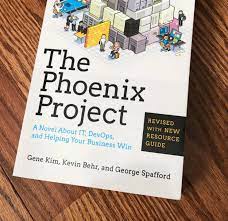The Phoenix Project is a novel about IT, DevOps, and helping your business win. It follows Bill, an IT manager at Parts Unlimited, who is tasked with salvaging a disastrous project and his journey through the challenges of modern IT practices.
In “The Phoenix Project,” readers are taken on a journey with Bill, an IT manager at the brink of a career-defining disaster. The book cleverly uses a fictional narrative to explore the complexities and challenges of IT operations within a large, struggling organization. As Bill and his team endeavor to turn around the failing Phoenix project, they encounter the principles of DevOps and lean manufacturing, learning valuable lessons on improving workflow, efficiency, and team dynamics. This story illustrates the transformative power of DevOps and agile practices in resolving business and technical issues, emphasizing collaboration, automation, continuous delivery, and proactive problem-solving.
The 10 main points learned from “The Phoenix Project” include:
- The Three Ways: Principles that guide DevOps practices, focusing on workflow, feedback, and continuous learning.
- Importance of Collaboration: Breaking down silos between departments to improve efficiency and outcomes.
- Continuous Improvement: Embracing change and making small, incremental improvements over time.
- Automation: The key to achieving speed, efficiency, and reliability in IT processes.
- Work in Progress Limits: Managing workload to prevent overburdening teams and ensure smooth flow of work.
- Feedback Loops: Essential for learning and improvement, allowing teams to quickly identify and address issues.
- Understanding the Entire Value Stream: Recognizing how each part of the process contributes to the final product or service.
- Culture of Experimentation: Encouraging innovation and learning from failure without fear.
- Lean Management: Applying lean principles to IT to maximize value and minimize waste.
- Focus on the Customer: Always prioritizing customer needs and aligning IT efforts to meet those needs effectively.
Some of the most impactful quotes from “The Phoenix Project” include:
- “Until code is in production, no value is actually being generated, because it’s merely a capital expense.”
- “Improving daily work is even more important than doing daily work.”
- “Any improvement not made at the constraint is an illusion.”
- “We will win only when we stop thinking of projects as something to finish and start thinking of them as a stage to go through.”
- “If you don’t understand how something works, you can’t improve it.”
- “A system with too much WIP is like a congested highway.”
- “Feedback is the key to improvement.”
- “DevOps is not about what you do, but what your outcomes are.”
- “To win in the marketplace, you must first win in the workplace.”
- “The best architectures, requirements, and designs emerge from self-organizing teams.”
For those interested in exploring similar concepts further, related books include:
- “Lean Enterprise” by Jez Humble, Joanne Molesky, and Barry O’Reilly, focusing on applying lean principles to software development and IT.
- “Accelerate: The Science of Lean Software and DevOps” by Nicole Forsgren, Jez Humble, and Gene Kim, which provides research-backed practices for improving software delivery performance.
- “Continuous Delivery” by Jez Humble and David Farley, offering a comprehensive guide to the principles and practices of continuous integration, continuous delivery, and DevOps.
- “The DevOps Handbook” by Gene Kim, Patrick Debois, John Willis, and Jez Humble, further exploring how to implement DevOps practices to increase productivity, efficiency, and the value of IT within an organization.
These resources can provide readers with a deeper understanding of the principles introduced in “The Phoenix Project” and how to apply them in various organizational contexts.
